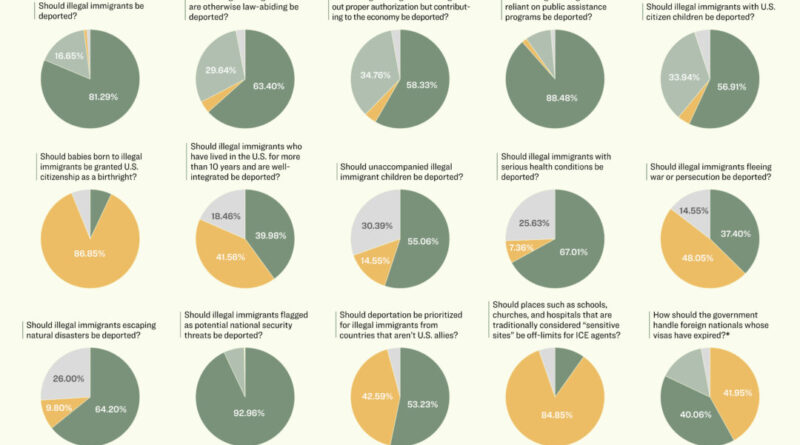Substantial Backing for Deporting Illegal Immigrants, Yet With Complex Views: Epoch Readers’ Survey
As President Donald Trump fulfills his campaign promise to intensify measures against illegal immigration, the readership of The Epoch Times shows a robust inclination toward stringent enforcement and deportation of unauthorized immigrants—though with certain distinctions.
An online survey conducted from January 29 to 30, gathering responses from 54,144 individuals, indicates substantial backing for the deportation of illegal immigrants, especially those identified as security risks or dependent on public welfare.
Nonetheless, the survey results reveal varying opinions on how immigration policy should handle individuals with deep ties to the U.S., those who have overstayed their visas, and employment situations.
While a predominant portion supports mass deportation, a considerable group advocates for a more nuanced approach, illustrating the ongoing discourse on how best to balance enforcement with economic and humanitarian aspects.
As Trump’s immigration enforcement measures escalate, the Epoch Times poll reveals that while readers broadly endorse deportation, their support is informed by critical distinctions regarding visa overstays, work status, familial connections, and national security threats.

Illegal immigrants from Haiti cross into the United States from Mexico through a gap in the border wall in Yuma, Arizona, on December 10, 2021. John Moore/Getty Images
Broad Consensus for Deportation
A significant majority of Epoch Times readers are in favor of deporting illegal immigrants. When asked the direct question—“Should illegal immigrants be deported?”—the response was overwhelmingly affirmative, with 81.3% of participants supporting deportation.
In contrast, 16.7% of the respondents supported deportation only after a case-by-case legal evaluation as opposed to automatic expulsion. A smaller fraction—0.9%—opposed deportation outright, asserting that illegal immigrants ought to remain, while 1.1% were uncertain.
Support for deporting illegal immigrants who rely on public assistance was even higher, with 88.5% in favor of removal, whereas 8.5% consented to permitting them to stay under specific conditions. Only 1.7% rejected the idea of deporting those on government aid, with 1.4% unclear.
The most robust support for deportation targeted illegal immigrants identified as potential security threats, with 93% backing immediate removal. A further 6.7% supported deportation, conditional upon a thorough investigation, while 0.2% opposed removal and 0.15% were unsure.
These results not only emphasize widespread backing for stricter immigration enforcement but also indicate a more nuanced position in certain cases.

Border Patrol agents oversee border crossings in Jacoumba, California, on January 10, 2024. John Fredricks/The Epoch Times
Deportation of Law-Abiding or Employed Immigrants
While the majority of respondents are in favor of deportation broadly, views become more complex when evaluating those without a criminal past, save for illegal entry.
A majority—63.4%—favor deporting illegal immigrants without any further offenses. However, nearly a third—29.6%—are inclined toward allowing such individuals to remain under specified conditions, which may include obtaining legal documentation or fulfilling certain residency and employment requirements. A smaller 3.9% entirely disapprove of deportation, while 3% remain uncertain.
When employment is considered, public opinion sharpens further. The poll reveals that 58.3% of Epoch Times readers favor deporting illegal immigrants who are employed, while 34.7% feel they should be permitted to stay if certain conditions like obtaining work permits or paying taxes are met. Only 4% outright opposed deporting these workers, and 2.9% are unsure.
These findings suggest that while a majority still supports enforcement, a notable minority acknowledges the economic contributions of illegal immigrant workers and prefers pragmatic solutions over mass deportation for their cases.
Visa Overstays and Connections to the U.S.
The survey also explored views on illegal immigrants who maintain strong ties to the U.S., unveiling a more divided perspective.
Among those surveyed, 57% supported the deportation of illegal immigrants who have U.S.-born children, while 33.9% favored permitting them to stay under specific conditions. A smaller 4.1% opposed deportation entirely, with 5.1% unsure.
Regarding unaccompanied illegal immigrant children, 55.1% of respondents backed deportation, whereas 14.5% believed they should be allowed to stay, and a significant 30.4% were uncertain.

A pregnant illegal immigrant from El Salvador stands beside a U.S. Border Patrol vehicle near Rio Grande City, Texas, on December 7, 2015. Many pregnant women, according to Border Patrol agents, cross without authorization into the United States late in their pregnancies with the intention of giving birth on U.S. soil to secure birthright citizenship. John Moore/Getty Images
Among those who have been living in the U.S. for over a decade, 40% supported deportation, while a slightly larger portion—41.6%—was in favor of allowing them to stay. Another 18.5% were uncertain.
Attitudes toward visa overstays were almost equally divided. The survey revealed 42% supportive of immediate deportation, while 40% preferred allowing visa overstayers the opportunity to renew their visas. Additionally, 15.1% supported permitting such individuals to remain under specific conditions—like employment or family connections—while 2.9% were unsure.
This split indicates that many respondents perceive visa overstays differently than illegal border crossings, showing some willingness for policy approaches allowing visa overstayers to remain legally in the country.
Views on Asylum Seekers, Birthright Citizenship, and Other Factors
While respondents showed broad support for deportation, their opinions softened when humanitarian considerations were taken into account.
Overall, 48% of participants asserted that illegal immigrants escaping war or persecution should not be deported and should instead be allowed to apply for asylum. However, 37.4% still supported deportation even in these situations, with 14.6% uncertain.
In instances of natural disasters, 64% believed that illegal immigrants seeking refuge from such calamities should still face deportation, while only 9.8% opposed deportation for those affected by natural disasters, and 26% were unsure.

A woman in shackles is searched before boarding the first flight deporting illegal Venezuelans following a U.S.–Venezuelan agreement in Harlingen, Texas, on October 18, 2023. Veronica G. Cardenas/AFP via Getty Images
In terms of national security, 53.2% of respondents asserted that deportations should be prioritized for illegal immigrants hailing from countries not allied with the U.S., whereas 42.6% felt that nationality should not play a role in deportation decisions.
When it comes to sensitive locations, such as churches, schools, and hospitals, 84.9% agreed that these locations should not be exempt from immigration enforcement. Meanwhile, 9.8% believed these areas should remain protected from enforcement actions, and 5.3% were unsure.
The survey findings collectively demonstrate a robust public inclination toward immigration enforcement, coupled with notable segments of public debate—especially concerning visa overstays, economic impacts, and individuals fleeing conflict. While deportation remains the predominant opinion, a significant segment of respondents shows willingness to consider specific circumstances under which illegal immigrants could remain in the United States—potentially influencing future policy discussions.




